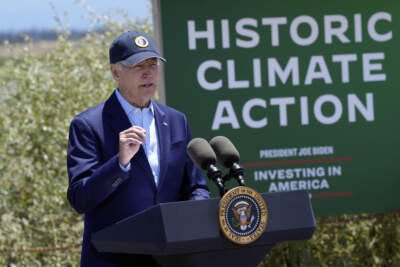Advertisement
Commentary
Project 2025 tells us what a second Trump term could mean for climate policy. It isn’t pretty

Simply saying there is a lot at stake for the climate in the 2024 election understates the outcome’s potential for profound global impact. The chasm between the parties on climate issues is broad, deep and dangerous. Unfortunately, many people aren’t paying attention.
When pollsters ask voters what their top issues are, climate comes in fifth, at best. But more often, it's far down the list or at the bottom. In a poll conducted last summer, only 27% percent of voters were acquainted with the Inflation Reduction Act, the Biden administration's marquee climate legislation. And a recent article in the New York Times points out that many voters are unaware of the implications of the sharp divide between the parties on this critical question.
Our democratic processes and political dynamics have left climate policy largely on the sidelines of electoral discourse despite the yawning ideological gap between the parties. On the right, the Heritage Foundation, a prominent conservative think tank with deep ties to the MAGA movement, has set the climate agenda. Last year, the foundation's Project 2025 released a 920-page document titled "Mandate for Leadership," which outlines a comprehensive plan for a potential Republican administration to implement the organization's vision of limited government and free-market economics.
The plan’s proposals include eviscerating existing climate programs and increasing reliance on fossil fuels. It emphatically repudiates efforts to decarbonize the economy and is a wholesale reversal of the progress made on climate policy over recent years.
The authors of the mandate don't deny the reality of climate change or that humans cause it; their central premise is that the risks of climate change are overstated. They maintain the world’s best course of action is to abandon the idea of a green energy transition, continue the unabated exploitation of fossil fuels, and deal with the ensuing consequences, which they say will be "mild and manageable." Without this dubious tenet, their program is incoherent.
Project 2025 advocates disbanding various bureaucratic offices related to renewable energy and climate science, among them the Office of Energy Efficiency and Renewable Energy, the Loan Program Office, the Clean Energy Corps, the Grid Deployment Office and the National Oceanic and Atmospheric Administration. The Project 2025 document says, “Government … should not be picking winners and losers in dealing with energy resources or commercial technology,” using one of the right’s favorite tropes about incubating nascent technology.
It doesn't stop there. “The new energy crisis is caused not by lack of resources, but by extreme ‘green’ policies,” the report chides. It calls for loosening existing fuel economy standards, weakening the Endangered Species Act, expanding oil and gas drilling in the Arctic, eliminating appliance efficiency standards and fast-tracking environmental approvals for natural gas infrastructure.
Project 2025 also calls for the repeal of the 2022 Inflation Reduction Act, which creates powerful incentives to develop clean energy. And it would gut the Infrastructure Investment and Jobs Act, which includes provisions for decarbonizing our transportation systems.
Much of the voting public is disturbingly unaware of both Biden’s climate record and the assault that Project 2025 would marshal against it.
But there's more. Not only does the plan espouse exiting the 2015 Paris Agreement, it suggests quitting altogether the United Nations Framework Convention on Climate Change. That would be a radical rejection of the international community's collective efforts to address the climate crisis. Withdrawal from the Framework Convention would diminish global capacity for funding climate adaptation while marginalizing the United States in climate negotiations.
Finally, the plan includes a recommendation "to update the 2009 endangerment finding," referring to the Environmental Protection Agency’s ruling that followed from the landmark Supreme Court decision in Massachusetts v. EPA. The endangerment finding allows the EPA to regulate carbon dioxide as a pollutant and undergirds much of what the agency can do about greenhouse gas emissions. The suggestion that this pillar of the regulatory framework would be weakened or removed is ominous.
The contrast between Project 2025’s climate prescriptions and the policies of the Democratic Party is striking. Despite some notable exceptions, the Biden administration has taken a comprehensive approach to promoting renewable energy and combating climate change. The US rejoined the Paris Agreement. The Inflation Reduction Act passed under Biden aims to reduce carbon emissions by 40 percent by 2030. The administration has placed limits on oil and gas leases on federal land. Recently, the White House announced a pause in approving new permits for export of liquefied natural gas, a move that drew the ire of the fossil fuel power establishment.
Advertisement
Much of the voting public is disturbingly unaware of both Biden’s climate record and the assault that Project 2025 would marshal against it.

When a substantial number of voters fail to weigh the ramifications of profound policy differences between two political parties on a crucial issue, it exposes troubling weaknesses in our democratic process.
This election will determine whether the energy and environmental justice policies Biden has advanced will be fully implemented or recklessly rolled back. It will also determine the role of the U.S. in the international community's effort to act on climate mitigation and adaptation. It will either keep the nation on track toward its mid-century targets for a carbon-free energy economy or introduce delays in the transition the world cannot afford.
Understandably, voters tend to prioritize immediate economic concerns like inflation and healthcare costs when casting their ballots. Controversial topics like immigration, guns, crime and abortion reliably crowd out environmental concerns. And most voters have already made up their minds about November’s election based on party identity.
Climate policy has never been a deciding factor in presidential elections. It wasn't in 2016, when hours of televised debates yielded a single question on it, and it had only a limited impact in 2020. Our political process doesn't excel at amplifying causes that serve the common good in the long term rather than the individual in the short term. It discounts the value of confronting disruptive change when faced with a systemic crisis.
But as Thomas Jefferson said, "A well-informed citizenry is the best defense against tyranny." It may also be our best defense against climate chaos. In a close election that may hinge on a few votes in a few states, every undecided voter in a swing state needs to know about the dangerous agenda of Project 2025.
